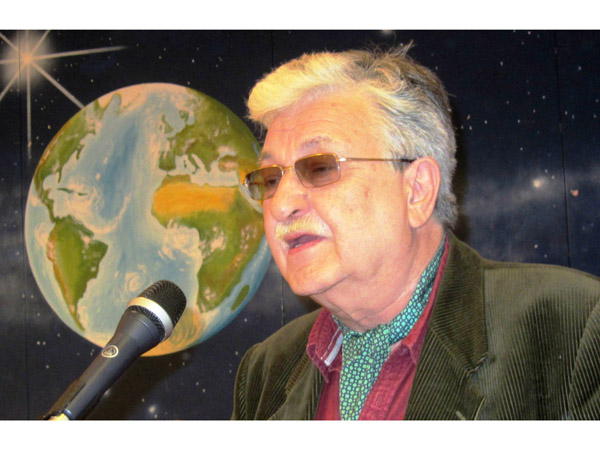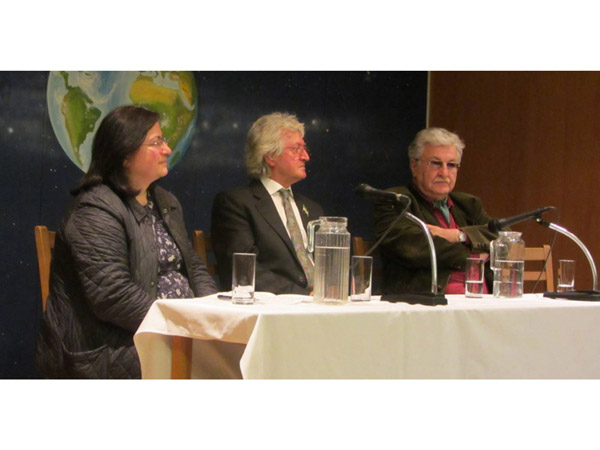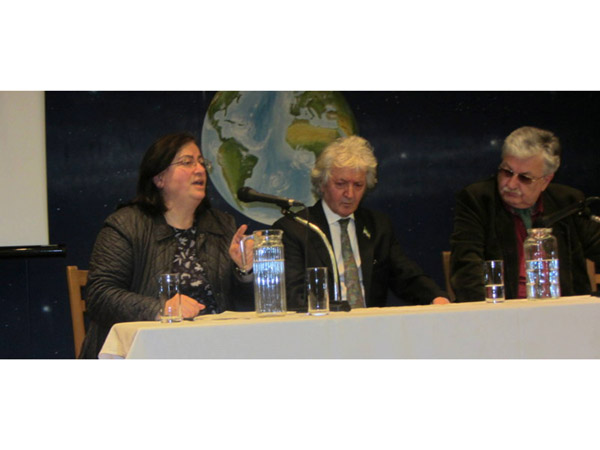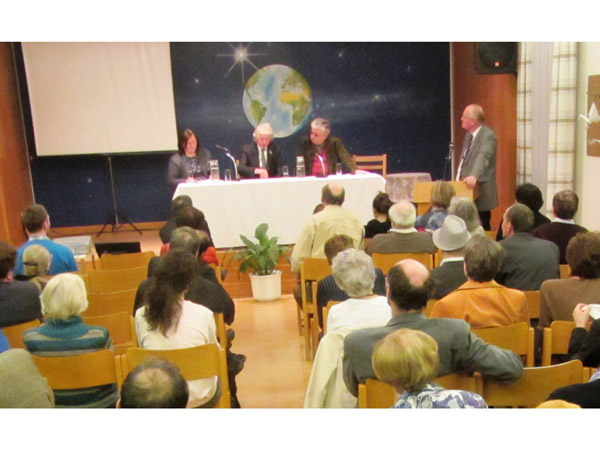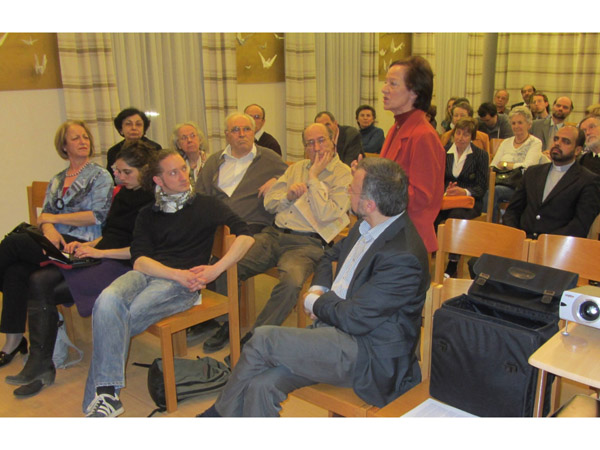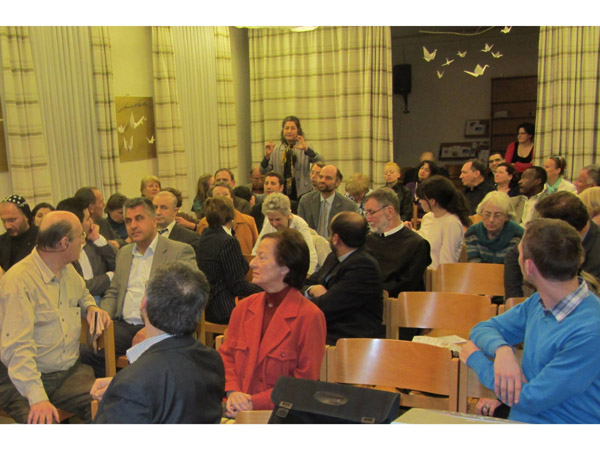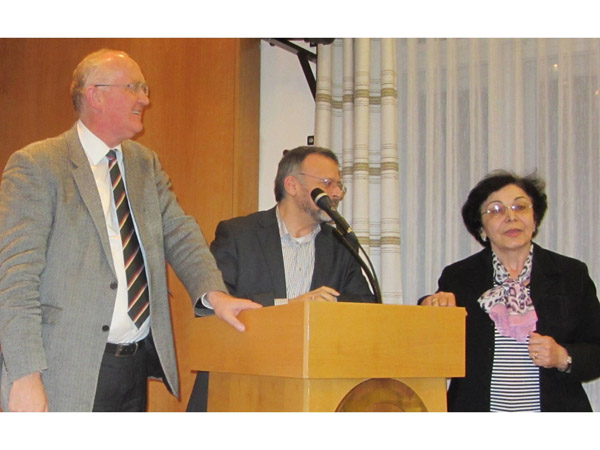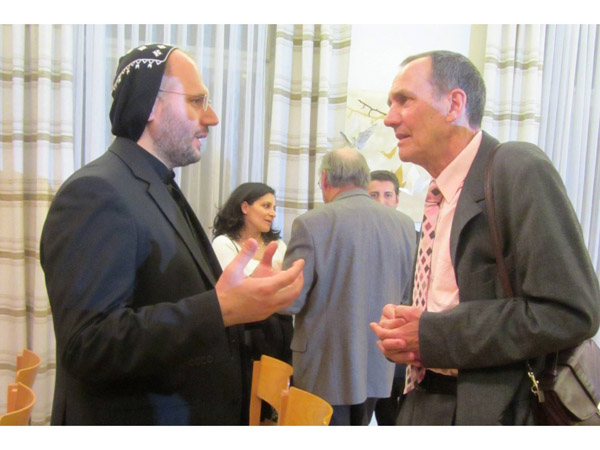Peace and Security
Syrian Christians in Austria Torn between Despair and Hope for Peace
Written by UPF - Austria
Tuesday, April 16, 2013
Vienna, Austria - UPF-Austria held a panel discussion on April 16 on the current situation in Syria. Sixty people attended, among them quite a few Syrians of different faiths, convictions, and loyalties living in Vienna. Originally Chorepiskopos Dr. Emanuel Aydin of the Syrian Orthodox Church in Vienna planned to speak, but at short notice he had to attend a Religions for Peace conference in Istanbul.
To start the evening, UPF Ambassador for Peace Dr. Leo Gabriel, a journalist, anthropologist, and filmmaker, showed his own film "On the ruins of Aleppo," which he had produced just a few month ago during a visit to Syria. The movie consisted of interviews with representatives of different groups of the "insurgents," which expressed the complexity of the situation very well. In the background viewers could see different places of the city of Aleppo where the fighting had taken place.
After the film, Mr. Assad Khayat, a writer from Syria and member of the advisory committee of the Union of Oriental Christians in Vienna, gave his assessment of the situation: "Christians have been in Syria since Christianity began. The name 'Christian' was mentioned for the first time in Syria. Also, the first Christian churches were built in Syria. Therefore, the Syrian Christians have a strong national identity; they are rooted in the country and the culture. It is estimated that 10-15% of the population are Christians. In the current conflict, they are divided into three groups:
1) those who support the government
2) those who are neutral
3) those who support the rebels
The uprising against the Assad regime began peacefully and without weapons and continued in this way for six months. Assad himself has confirmed this. After many atrocities on the part of the regime, the Syrian people wanted to defend themselves. But the Christians to not do military service; therefore, they have no weapons. They would never use weapons against their own brothers. According to Mr. Khayat, they cannot support the corrupt system of the president Bashar al-Assad.
Mrs. Marie-Therese Kiriaky, founder and chairman of the Association of Arab Women in Vienna, said "The Syrian Christians are not persecuted, neither by the government nor by the opposition. The conflict cannot be confined to a group. We are part of the Syrian society and as such we would like to support the uprising against the Assad regime. The number of Syrians killed now exceeds 100,000, including many civilians, women, and children. There are 200,000 detainees. Syrian refugees inside Syria number 5 million, and outside Syria 2 million. The refugee camps in Turkey are well organized, but in Jordan there is almost no care for the refugees, although some have been there for three years. The winters have been especially harsh for the refugees. Iraq did not even want to receive Syrian refugees, but eventually they accepted 45,000. However they cannot provide the necessary supplies for them. Most of the people who died in the conflict were Muslims. It is most important to find a way to resolve this conflict peacefully."
In the discussion that followed, people from the audience had the opportunity to ask questions or make comments, which was used by many. The representatives of the Syrian Orthodox Church in Vienna who were in the audience felt inadequately represented in the presentations. For them, the persecution of Christians is a serious problem in Syria. In their opinion, this is an Islamic movement fighting for an Islamist state. If the "rebels" were to come to power, the Christians fear the loss of their religious freedom which had been guaranteed to them until now. As an example, they referred to Libya, where after the takeover by the Islamists many Europeans have left the country. A Syrian living in Vienna interjected that the dictatorship in Syria, which has been in power since 1963, must end.c If the Muslim Brotherhood is elected, then they would have to be endured for a few years until they are voted out again and another party comes to power.
In the final round, Dr. Leo Gabriel reported that he was recently at a meeting in Duesseldorf, Germany, which was attended by representatives of almost all Syrian interest groups. Each party was aware that the situation cannot continue as it had during the past months. Ways have to be found for a peace treaty. One must also admit objectively that the largest part of the free Syrian army is not composed of Islamists but is made up of defectors from the army of the former Syrian government.
Peter Haider, who led the discussion, tried to allow many people of different opinions and experiences to have their say. The discussions continued at the buffet after the official program. It was very positive to see that the representatives of the various Syrian interest groups came into contact with each other and new relationships were established.
NOTE: UPF has convened or contributed to a number of civil-society forums on the crisis in Syria:
Vienna, Austria: All-Sides Consultation for a Political Solution to the Syrian Conflict, Mar. 8-9, 2014
Buenos Aires, Argentina: To Establish Peace in Syria, the Middle East and the World, Feb. 6, 2014
Geneva, Switzerland: Track 2 Consultation: Toward Peace and Reconciliation in Syria, Executive report of the consultation Jan. 25, 2014
Washington DC, USA: Women's Role in Syria's Transition and Reconciliation, Jan. 15, 2014
Vatican City: Pontifical Academy of Sciences Convenes Consultation on Syria, Jan. 13, 2014
Jerusalem, Israel: The Crisis in Syria and Its Regional Impact, Oct. 16, 2013
Washington DC, USA: Peace Zones as Avenues for Stability in South Sudan, Syria, Colombia and Korea, Oct. 15, 2013
Amman, Jordan: Prospects for Dialogue and Reconciliation in Syria, Oct. 13, 2013
Vienna, Austria: Syrian Christians in Austria Torn Between Hope and Despair, Apr. 16, 2013
Jerusalem, Israel: The Impact of Syria and Egypt on Israel's Security Measures, Feb. 14, 2013
Washington DC, USA: The Tragedy and Hope for Syria, Sept. 26, 2012
See also: Interfaith Declaration on Peace in Syria Oct. 13, 2013
If you find this page helpful and informative please consider making donation. Your donation will help Universal Peace Federation (UPF) provide new and improved reports, analysis and publications to you and everyone around the world.
UPF is a 501(c)(3) tax exempt organization and all donations are tax deductible in the United States. Receipts are automatically provided for donations of or above $250.00.
|
Donate to the Universal Peace Federation: Your donation to support the general programs of UPF. |
Donate to the Religious Youth Service (RYS): Your donation will be used for service projects around the world. |
Donate to UPF's Africa Projects: Your donation will be used for projects in Africa. |
Related Articles

Australia
UPF-Australia Convenes Mutual Prosperity Summit
Melbourne, Australia—The Mutual Prosperity Summit focused on “Rethinking Our Economic Models.”


